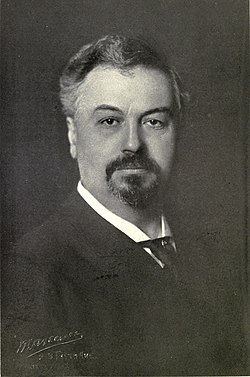Oscar Hammerstein I
| Oscar Hammerstein I | |
|---|---|

Portrait from Who's Who on the Stage, 1906
|
|
| Born |
May 8, 1846 Stettin, Kingdom of Prussia |
| Died | August 1, 1919 (aged 73) Manhattan, New York, U.S. |
| Occupation | Businessman, composer, theater impresario |
| Children |
Arthur Hammerstein Willie Hammerstein |
| Relatives | Oscar Hammerstein II (grandson) |
Oscar Hammerstein I (8 May 1846 – 1 August 1919) was a German-born businessman, theater impresario, and composer in New York City. His passion for opera led him to open several opera houses, and he rekindled opera's popularity in America. He was the grandfather of American lyricist Oscar Hammerstein II and the father of theater manager William Hammerstein and American producer Arthur Hammerstein
Oscar Hammerstein I was born in Stettin (capital of the province of Pomerania), Kingdom of Prussia (now Szczecin, Poland), to German Jewish parents Abraham and Berthe Hammerstein. He took up the flute, piano, and violin at an early age. His mother died when he was fifteen years old. During his youth, Hammerstein's father desired him to continue with his education, wanting him to specialize in topics such as algebra, but Hammerstein desired to pursue music. After Oscar went skating in a park one day, his father found out and whipped him as punishment; this would spur Hammerstein to run away to North America. After selling his violin, Hammerstein ran away to Liverpool, and from there, took a three-month journey to the United States arriving in New York City in 1864.
Hammerstein made ends meet initially by working at a cigar factory on Pearl Street. He worked his way up to become a cigar maker himself, and also founded the U.S Tobacco Journal. Hammerstein would eventually become the owner of at least 80 patents, with most of them being related to the machines he made for the cigar-making process. Hammerstein's most well-known contribution to the cigar-making process is adding an air-suctioning component to the traditional cigar-making machines, and the component would hold down the tobacco leaves firmly so that they could be cut more cleanly.
...
Wikipedia
